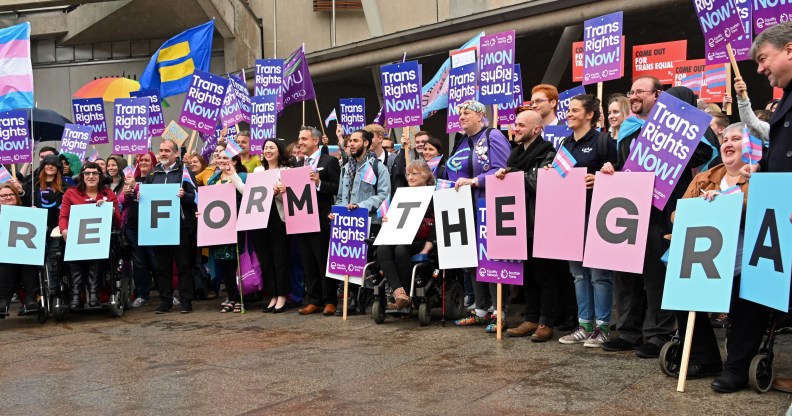Scottish trans rights consultation flooded with opposition from ‘women’s groups’ and religious orgs

Protesters demonstrate outside the Scottish Parliament for reform of the GRA on June 12, 2019 in Edinburgh. (Ken Jack/Getty Images)
Protesters demonstrate outside the Scottish Parliament for reform of the GRA on June 12, 2019 in Edinburgh. (Ken Jack/Getty Images)
Women’s groups and religious organisations were the main opponents to trans rights reform in Scotland in a major public consultation.
Opposition to lowering the age that trans people can access legal gender recognition from 18 to 16 in Scotland came from religious organisations and “women’s groups”, the consultation on Gender Recognition Act reforms found.
Fifty-four per cent of organisations that responded to the consultation backed reducing the minimum age at which a person can apply for legal gender recognition from 18 to 16, as did 56 per cent of people who answered as individuals.
The organisations who backed lowering the age included four out of the five children or young people’s organisations who responded, which were the Allsorts Youth Project, Children and Young People’s Commissioner Scotland, Children in Scotland, The Scottish Youth Parliament and YWCA Scotland – The Young Women’s Movement.
However strong opposition came from religious or belief organisations. Of the 35 that responded, just two, both based in Scotland, supported lowering the age. Twenty-seven religious groups in Scotland opposed lowering the age, as did three from the rest of the UK and two from the rest of the world. One Scottish religious group did not answer the question.
Some of the religious groups that responded are publicly against what they term “gender ideology” – anything that doesn’t promote heterosexuality and fixed gender roles, such as equal marriage or trans people. These include Christian Concern and Anscombe Bioethics Centre, which is also anti-abortion.
Similarly, most women’s groups who answered the consultation opposed reforming the GRA to lower the age from 18 to 16.
Many of the women’s groups who responded and who oppose reforming the Gender Recognition Act were set up specifically to oppose trans rights reform, including the Authentic Equity Alliance, Fair Play For Women, For Women Scotland, Woman’s Place UK and the Women’s Human Rights Campaign, which last year demanded the “elimination of transgenderism“.
Thirty-four women’s groups responded to the consultation, with just three, all based in Scotland, backing reforms to allow trans 16- and 17-year-olds to apply for legal gender recognition.
Fourteen women’s groups in Scotland opposed lowering the minimum age for legal gender recognition, as did 12 in the rest of the UK and two from the rest of the world. One Scottish women’s group said they did not know whether the age should be lowered, while one Scottish women’s group and one from the rest of the UK did not answer the question.
The Scottish government was seeking public input on its draft bill reforming the Gender Recognition Act (GRA), which is how adult trans men and women can update the gender on their birth certificates for the purposes of marriage and pensions.
The draft bill proposes that the gender-recognition process is changed so that Scotland’s Registrar General issues a Gender Recognition Certificate (GRC), instead of an individual having to apply to a Gender Recognition Panel, which is a UK tribunal.
This will include removing the current requirement that trans people provide medical evidence, including a diagnosis of gender dysphoria and proof of having lived in the “acquired gender” for two years, to a panel of strangers that they will never meet.
Instead, applicants will have to prove – usually with utility bills, employment contracts and other official documents – that they’ve lived in their “acquired gender” for three months before they can apply for legal gender recognition. The proposals will also add a three month “reflection period” that applicants must wait through after applying before they can proceed.
First consultation also saw clear support for reforming Gender Recognition Act
This was the Scottish government’s second public consultation on reforming the Gender Recognition Act, after the majority of respondents to the first clearly supported reform.
Women’s groups responded positively to Scotland’s first public consultation on reforming the GRA, which was open from 9 November 2017 to 1 March 2018.
There were 15,697 responses, and 60 per cent of people who responded – rising to 65 per cent of people based in Scotland – said they backed plans to introduce a self-declaratory system for legal gender recognition.
Women’s organisations in Scotland, including Close the Gap, Engender, Equate Scotland, Rape Crisis Scotland, Scottish Women’s Aid, Women 50:50 and Zero Tolerance, released a joint statement supporting a self-declaratory system for legal gender recognition in response to the consultation.
“We do not regard trans equality and women’s equality to contradict or be in competition with each other,” the joint statement said.
The statement was organised by services who support women who have experienced sexual or domestic violence, as well as organisations that campaign for gender equality more broadly.
The second public consultation, this time seeking input on the draft bill containing the proposed changes that were supported in the first consultation, closed on 19 March, 2020 – right as the coronavirus pandemic swept across the globe.
As a result, the Scottish government postponed its analysis of the results and publication of the draft bill until September 2021.

